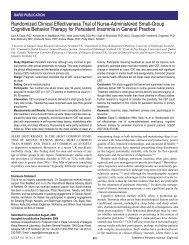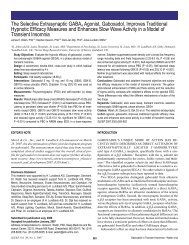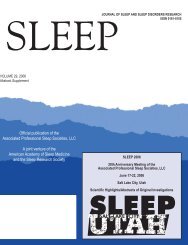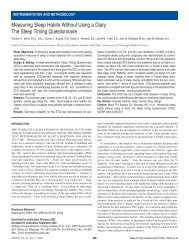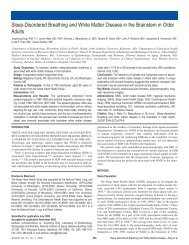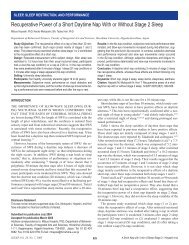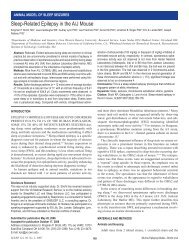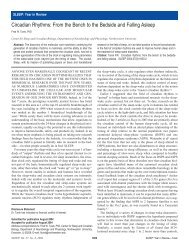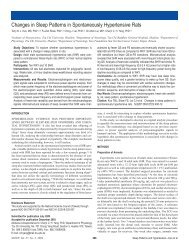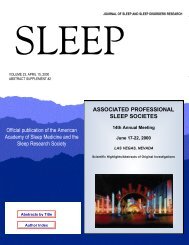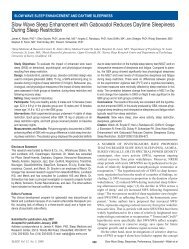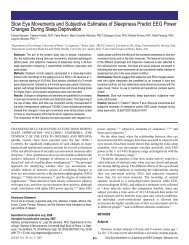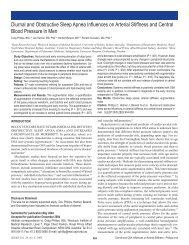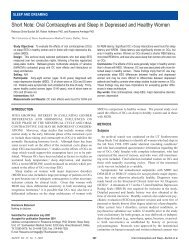SLEEP 2011 Abstract Supplement
SLEEP 2011 Abstract Supplement
SLEEP 2011 Abstract Supplement
You also want an ePaper? Increase the reach of your titles
YUMPU automatically turns print PDFs into web optimized ePapers that Google loves.
A. Basic Science XI. Sleep Deprivation<br />
0263<br />
CHRONIC <strong>SLEEP</strong> FRAGMENTATION INCREASES<br />
MITOCHONDRIAL REACTIVE OXYGEN SPECIES<br />
PRODUCTION AND OXIDATIVE STRESS IN CORTEX<br />
Kaushal N, Ramesh V, Zhang S, Wang Y, Gozal D<br />
Pediatrics, University of Chicago, Chicago, IL, USA<br />
Introduction: Sleep fragmentation (SF) is an important component of<br />
many sleep disorders, including obstructive sleep apnea and is believed<br />
to contribute to end-organ morbidity. However, the mechanisms underlying<br />
SF-associated functional alterations remain elusive.<br />
Methods: C57BL/6 mice (n=7) were chronically implanted with telemetric<br />
transponders to measure EEG, EMG, body temperature (Tb) and<br />
gross activity (Ag) at 8 months. After surgical recovery, the mice were<br />
acclimatized in a custom developed SF chamber. Following that, the<br />
mice were subjected to 15 days of chronic SF for 12 hours/day from<br />
7am to 7pm (every 2 min). Sleeping mice served as control. After the<br />
SF procedure the mice were sacrificed, and the brain was harvested<br />
and dissected. The cortex was assayed for the oxidative markers malondialdehyde<br />
(MDA) and 8-hydroxy-2’-deoxyguanosine (8-OHdG). In<br />
addition, mitochondrial isolation was conducted in cortices from SF<br />
and control and ROS production was determined using flow cytometric<br />
approaches.<br />
Results: Following 15 days of SF, there were significant increases in<br />
both MDA and 8-OHdG in the cortex. In live isolated mitochondria, a<br />
marked increase in ROS production was apparent.<br />
Conclusion: SF induces oxidative stress in cortex via mechanisms that<br />
involve excessive production of ROS in mitochondria.<br />
Support (If Any): NIH grant HL 086662 (DG)<br />
0264<br />
<strong>SLEEP</strong> DEPRIVATION UNDER SUSTAINED HYPOXIA<br />
PROTECTS AGAINST OXIDATIVE STRESS<br />
Ramanathan L 1,2 , Siegel J 1,2<br />
1<br />
Psychiatry and Biobehavioral Sciences, UCLA, Los Angeles, CA,<br />
USA, 2 Neurobiology Research, VAGLAHS, North Hills, CA, USA<br />
Introduction: We previously showed that sleep deprivation alters antioxidant<br />
responses in several rat brain regions. We also reported that<br />
chronic hypoxia modifies antioxidant responses and increases oxidative<br />
stress in rat cerebellum and pons, relative to normoxic conditions. In the<br />
current study, we exposed rats to (6h) sleep deprivation under sustained<br />
hypoxia (SDSH), and compared changes in antioxidant responses and<br />
oxidative stress, in the neocortex, hippocampus, brainstem and cerebellum,<br />
to those occurring in control animals subjected to the same level of<br />
sustained hypoxia but left undisturbed (UCSH).<br />
Methods: We measured changes in total nitrite levels, as an indicator<br />
of nitric oxide production, superoxide dismutase (SOD) activity and total<br />
glutathione (GSHt) levels as markers of antioxidant responses, and<br />
levels of thiobarbituric acid reactive substances (TBARS) and protein<br />
carbonyls, as signs of lipid and protein oxidation products, respectively.<br />
We also measured changes in the activity of hexokinase (HK), the rate<br />
limiting enzyme in glucose metabolism.<br />
Results: We found that SDSH increased nitric oxide levels and decreased<br />
the levels of TBARS in the rat hippocampus relative to control<br />
hypoxic conditions. On the other hand, SDSH decreased nitric oxide<br />
levels and increased GSHt levels in the rat cerebellum relative to UCSH.<br />
Furthermore, SDSH increased GSHt levels, without affecting the levels<br />
of either nitric oxide, TBARS or carbonyl proteins in the rat neocortex<br />
and brainstem, compared to UCSH. SOD activity was not affected in<br />
any of the brain regions studied here. Additionally, we observed an increase<br />
in HK activity in the neocortex of SDSH rats compared to UCSH<br />
rats, suggesting that elevated glucose metabolism may be a potential<br />
source of increased free radical production in this brain region.<br />
Conclusion: We conclude that acute (6h) SDSH differentially affects<br />
various rat brain regions, but overall it protects against oxidative stress.<br />
Short term insomnia may therefore serve as an adaptive response to prevent<br />
sustained hypoxia-induced cellular injury.<br />
Support (If Any): Research supported by NS14610, MH64109 and the<br />
Medical Research Service of the Department of Veterans Affairs.<br />
0265<br />
<strong>SLEEP</strong>LESS NIGHTS AND STRESSFUL DAYS: <strong>SLEEP</strong><br />
DEPRIVATION AND MENTAL STRESS AMPLIFY SURGES IN<br />
BLOOD PRESSURE<br />
Franzen PL 1 , Gianaros PJ 1 , Marsland AL 2 , Hall MH 1,2 , Siegle GJ 1 ,<br />
Dahl R 3 , Buysse DJ 1<br />
1<br />
Department of Psychiatry, University of Pittsburgh School of<br />
Medicine, Pittsburgh, PA, USA, 2 Department of Psychology,<br />
University of Pittsburgh, Pittsburgh, PA, USA, 3 Department of Public<br />
Health, University of California Berkeley, Berkeley, CA, USA<br />
Introduction: Sleep disturbances and psychological stress are highly<br />
prevalent, and both are implicated in the etiology of cardiovascular diseases.<br />
Given their tendency to co-occur, they may act synergistically in<br />
cardiovascular pathogenesis. To test for additive effects of sleep deprivation<br />
and psychological stress on blood pressure, we examined acute<br />
stress reactivity following rested and sleep-deprived experimental conditions<br />
in healthy young adults.<br />
Methods: Participants included 20 young adults 20-25 years old free<br />
from current or past sleep, psychiatric, or major medical disorders. Using<br />
a within-subjects crossover design, we examined acute stress reactivity<br />
under two experimental conditions: following a night of normal<br />
sleep in the laboratory and following a night of total sleep deprivation.<br />
Two standardized psychological stress tasks were administered, a Stroop<br />
color-word naming interference task and a speech task, which were preceded<br />
by a pre-stress baseline and followed by a post-stress recovery<br />
period. Each period was 10 minutes in duration, and blood pressure<br />
recordings were collected every 2.5 minutes throughout each period.<br />
Mean blood pressure responses during the stress and recovery periods<br />
were examined with a mixed effects analysis of covariance, controlling<br />
for baseline blood pressure.<br />
Results: There was a significant interaction between sleep deprivation<br />
and stress on systolic blood pressure, F(2,83.4)=4.35, p=0.016. Systolic<br />
blood pressure was higher in the sleep deprivation condition compared<br />
with the normal sleep condition during the speech task, t(18)=2.93,<br />
p=0.009), whereas blood pressure did not differ between the sleep conditions<br />
during the Stroop task or the post-stress recovery period.<br />
Conclusion: Sleep deprivation amplified systolic blood pressure increases<br />
to psychological stress. Sleep loss may increase cardiovascular<br />
risk by dysregulating stress physiology. Based on these data, stress may<br />
be particularly important to address in individuals with sleep problems<br />
and vice versa in reducing cardiac vulnerability. Educational or behavioral<br />
interventions to prevent sleep loss could buffer the adverse health<br />
outcomes associated with stress.<br />
Support (If Any): K01 MH077106 UL1 RR024153 National Sleep<br />
Foundation Pittsburgh Mind-Body Center Health Research Formula<br />
Funds from the Pennsylvania Department of Health (Act 2001-77)<br />
0266<br />
INCREASES IN NOREPINEPHRINE ARE ASSOCIATED<br />
WITH FEWER MICRO<strong>SLEEP</strong>S DURING SUSTAINED<br />
WAKEFULNESS<br />
Simpson N, Cahalan C, Haack M, Mullington JM<br />
Neurology, Beth Israel Deaconess Medical Center/Harvard Medical<br />
School, Boston, MA, USA<br />
Introduction: Sleep loss is a significant and unique stressor, as sleep<br />
itself is a biological resource necessary to regulate multiple physiological<br />
systems. It was hypothesized that levels of norepinephrine, a marker<br />
of autonomic activation, would increase in response to sleep loss while<br />
levels of self-reported stress would not.<br />
A93<br />
<strong>SLEEP</strong>, Volume 34, <strong>Abstract</strong> <strong>Supplement</strong>, <strong>2011</strong>



